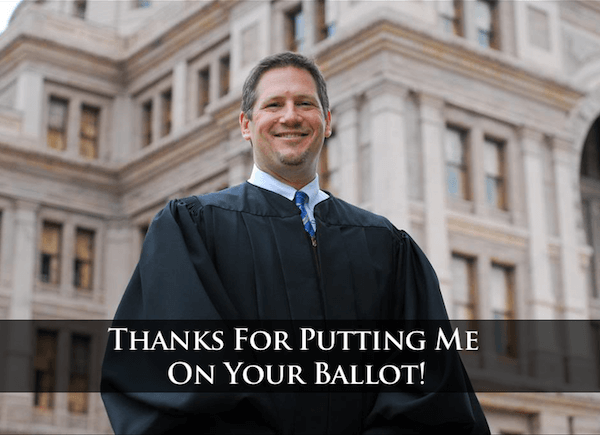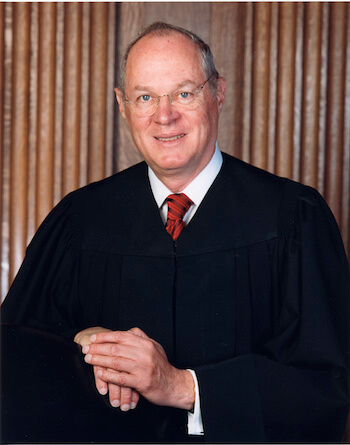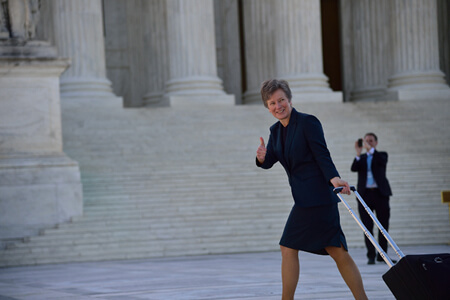In a big day for the marriage equality movement, trial judges moved the ball forward significantly in New Jersey and Illinois on September 27.
In New Jersey, Mercer County Superior Court Judge Mary C. Jacobson granted a motion for summary judgment filed by Lambda Legal on behalf of Garden State Equality, the state’s LGBT rights group, ruling the state must begin issuing marriage licenses to same-sex couples beginning on October 21, an order that likely will be stayed pending appeal.
In Illinois, Cook County Circuit Court Judge Sophia H. Hall denied a motion by several county clerks to dismiss two pending lawsuits brought by Lambda Legal and the American Civil Liberties Union contending that the denial of marriage rights to same-sex couples violates equal protection and due process provisions of the State Constitution.
Superior Court in Trenton orders equal marriage rights by October 21; Chicago judge allows lawsuit to go forward
The decisions may have a quick political impact, since legislative action on marriage equality is expected to come before legislators in both states before the end of the year. In New Jersey, a marriage equality law approved by the Legislature and vetoed by Governor Chris Christie last year could come up for a veto override vote in the lame duck session following the November election. In Illinois, a marriage equality measure approved by the Senate could get a vote in the General Assembly during the “veto session” that will begin late in October.
The prospect of court action could convince legislators reluctant, to date, to support marriage equality that enacting gay marriage by statute has the virtue of giving them input on protections for religious dissenters such as those put in place here in New York.
The New Jersey decision has the greater potential for applicability elsewhere, since Judge Jacobson broke new ground. She ruled that the US Supreme Court decision striking down the Defense of Marriage Act's ban on federal recognition of legal gay marriages made the Garden State’s failure to allow same-sex couples to marry unconstitutional in light of New Jersey’s civil union law that gives same-sex couples the legal rights that accompany marriage under state law. Her opinion provides an analysis that can now play out in the pending Illinois litigation as well as lawsuits in Hawaii and Nevada.
The New Jersey case was filed after the State Supreme Court deadlocked on the question of whether the civil union law failed to meet its 2006 mandate that same-sex couples be provided the same legal rights and benefits as different-sex couples. A review commission established when the Legislature enacted civil unions concluded that partners were not receiving equal treatment from government officials and private businesses. Relying on its report, Lambda Legal petitioned the New Jersey Supreme Court to reconsider whether same-sex couples were entitled to equal marriage rights, but the court could not muster a majority in favor of the petition, with some justices suggesting the trial court must first establish a factual finding of unequal treatment.
As Lambda prepared to go to court with its new case, the US Supreme Court handed down its DOMA ruling and the group promptly filed a summary judgment motion in Superior Court, arguing that federal recognition of same-sex marriages meant that civil union couples in New Jersey are deprived of equal rights as a matter of law. The DOMA ruling and subsequent actions by federal agencies make clear that all state-sanctioned same-sex marriages –– but only those that are state-sanctioned, not civil unions –– are due federal recognition.
The state made a variety of arguments, but its central assertion was that any difference in treatment between same-sex and different-sex couples after the DOMA decision was due to the federal government’s refusal to recognize civil unions, and not to any action taken by the state. Thus, the attorney general argued, the plaintiffs were suing the wrong defendants.
Jacobson rejected this argument, finding that by creating a domestic relations legal structure under which same-sex couples were excluded from equal access to the status of marriage, New Jersey had engaged in state action that resulted in same-sex couples having an inferior status.
“It is not the federal government acting alone that deprives plaintiffs of federal marriage benefits,” she wrote, “it is the federal government incorporating a state domestic relations structure to make its determinations, and it is that state structure that plaintiffs challenge in this motion. That structure may not have been illegal at the time it was created –– indeed, the parallel marriage/ civil union statutory scheme was specifically sanctioned in advance in [the state high court’s 2006 ruling] –– but it was certainly an ‘action’ of the state.”
Jacobson also rejected the state’s argument that her ruling was premature given that many federal agencies had not yet announced how they would adjust their policies post-DOMA and that bills have been introduced in Congress to extend federal recognition to civil union partners. Those partners are experiencing unequal treatment now in very tangible ways, she noted, particularly under federal tax law and the Family and Medical Leave Act.
“The current inequality visited upon same-sex civil union couples offends the New Jersey Constitution, creates an incomplete set of rights that [the 2006 decision] sought to prevent, and is not compatible with ‘a reasonable conception of basic human dignity,’” Jacobson wrote, quoting from the State Supreme Court’s earlier opinion. “Any doctrine urging caution in constitutional adjudication is overcome by such a clear denial of equal treatment.”
The judge delayed the effect of her ruling until October 21 to give the state time to appeal, something Christie has said it will do.
The Illinois ruling comes at an earlier stage in the litigation. Unlike Republican Christie, Illinois’ Democratic governor, Pat Quinn, was unwilling to defend against the litigation brought by Lambda and the ACLU, so a group of county clerks were allowed to intervene as defendants. Their motion argued that the existing law banning same-sex marriages does not discriminate unlawfully.
The plaintiffs claimed violations of the Illinois Constitution based on unlawful sexual orientation and sex discrimination and abridgments of the fundamental right to marry and the right to privacy. Judge Hall concluded the plaintiffs can pursue claims based on sexual orientation discrimination and the right to marry.
Hall found the plaintiffs’ claims raised the possibility that the court might conclude the state must demonstrate a strong or compelling policy justification for excluding same-sex couples from the right to marry and that the rationale advanced by the county clerks might prove insufficient to meet that burden. Alternatively, she also found that the plaintiffs might prevail on their claim that the same-sex marriage ban deprived them of a fundamental right, which would also impose a high burden on defenders of current law. The court’s analysis clearly signaled a likely outcome in favor of the plaintiffs at trial or in any motion for summary judgment they might file after discovery is complete.
Had Hall allowed the case to proceed as a sex discrimination claim, the requirement that existing marriage law be subjected to heightened scrutiny –– meaning the state would have to justify it by showing a compelling reason –– would be automatic, without any need for further proof. As a sexual orientation discrimination claim, however, the plaintiffs have the burden of first proving that heightened scrutiny is the appropriate standard for judicial review –– that, in judicial parlance, sexual orientation is a “suspect” or “quasi-suspect” classification for purposes of this litigation.
As the plaintiffs themselves pointed out, however, their case may be solid even if heightened scrutiny is not applied. If the state merely need demonstrate a “rational” justification for existing marriage law, its options are nonetheless limited. Since Illinois has in place a civil union law, which extends equal treatment to same-sex couples under the state’s family law regime, the county clerks cannot argue those couples should be barred from marrying due to concerns about the “best” circumstances for child-rearing or in order to reserve marriage to different-sex couples so they will channel their procreation responsibly.
The June DOMA ruling and the New Jersey Superior Court’s analysis of its impact on the equal protection claims of gay plaintiffs will undoubtedly lighten the plaintiffs’ burden in Illinois –– as Justice Antonin Scalia despairingly observed in his DOMA dissent, where he predicted the Supreme Court’s opinion would be very helpful to plaintiffs challenging the denial of marriage rights in the remaining non-equality states. The two September 27 decisions hasten Scalia’s nightmare.




































